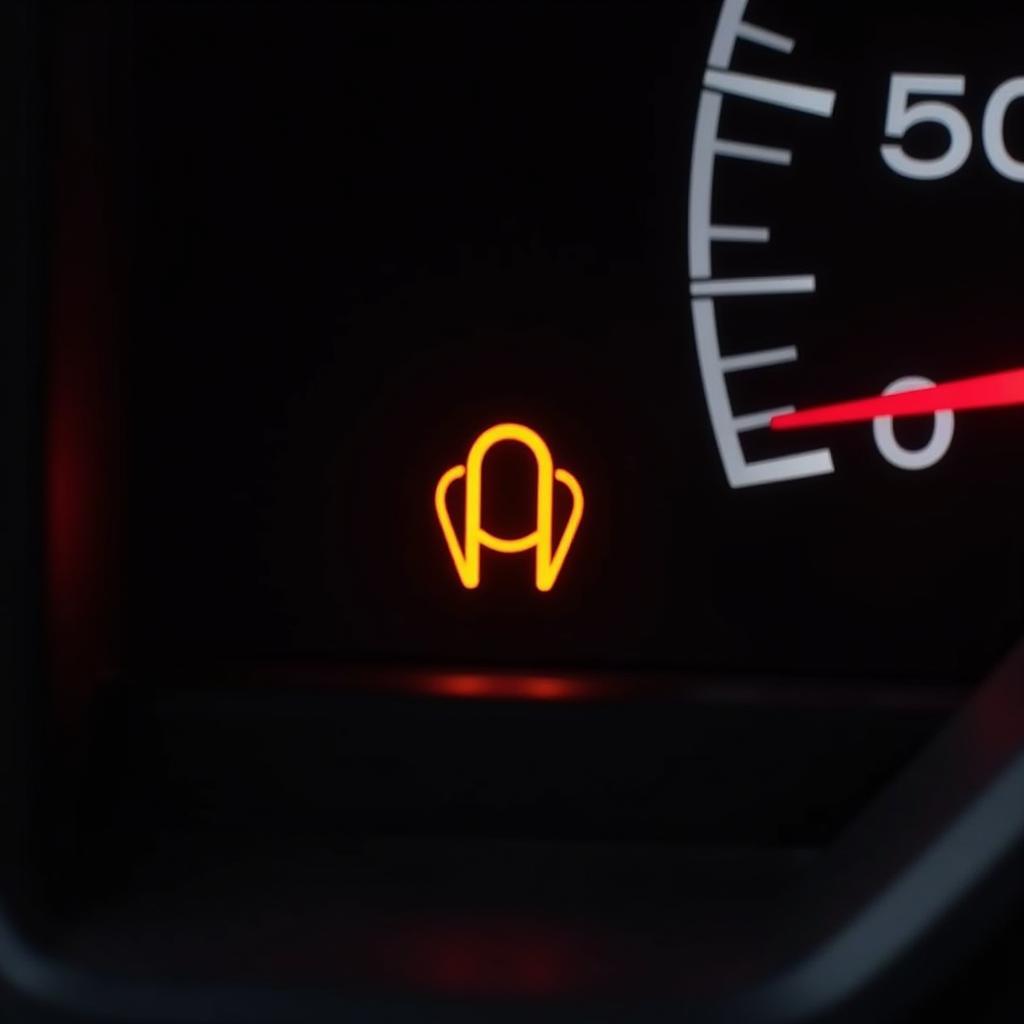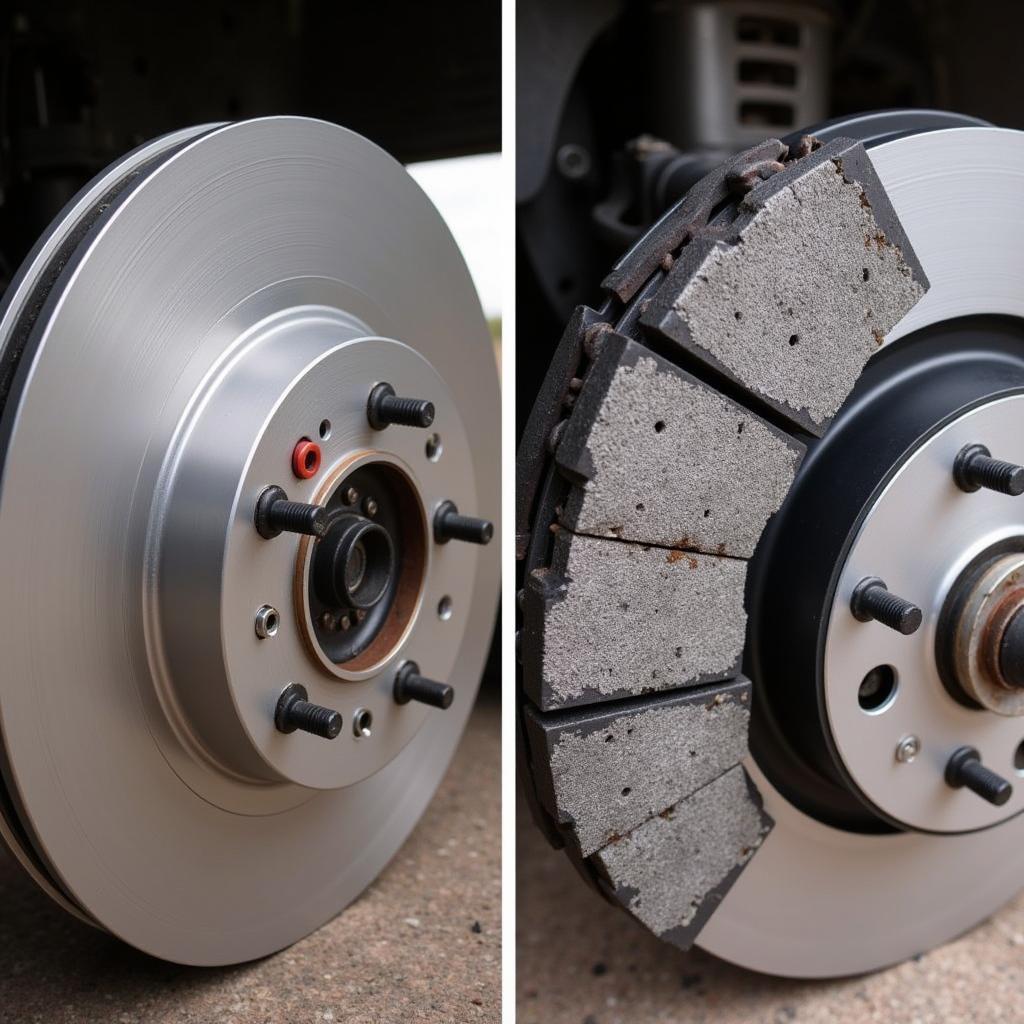The brake pad warning light on your VW T4 is a crucial safety feature that alerts you to potential issues with your braking system. Ignoring this warning could lead to costly repairs and dangerous driving conditions. This comprehensive guide will explore the common causes of a lit brake pad warning light in a VW T4, how to diagnose the problem, and the necessary steps to rectify it.
Understanding Your VW T4 Brake Pad Warning Light
The brake pad warning light, often symbolized by a circle with dotted lines on either side and a exclamation mark in the middle, illuminates on the dashboard when the brake pad sensors detect wear beyond a predetermined limit. This system is designed to give you ample time to address the issue before it compromises your ability to brake safely.
 VW T4 Dashboard Showing Brake Pad Warning Light
VW T4 Dashboard Showing Brake Pad Warning Light
Common Causes of a Lit Brake Pad Warning Light
While worn brake pads are the most common culprit, several other factors can trigger the warning light in your VW T4:
- Worn brake pads: Over time, the friction material on your brake pads wears down, eventually triggering the warning light.
- Faulty brake pad wear sensor: The sensor itself can malfunction due to damage, corrosion, or a loose connection, leading to a false warning.
- Low brake fluid level: Brake fluid plays a vital role in transmitting force to the brakes. If the fluid level is low, it could indicate a leak in the system, potentially triggering the warning light.
- Issues with the ABS system: Although less common, problems within the Anti-lock Braking System (ABS), such as a faulty sensor or control module, can also illuminate the brake pad warning light.
Diagnosing the Problem: A Step-by-Step Guide
- Check the brake fluid level: Locate the brake fluid reservoir under the bonnet and check the fluid level. If it’s below the minimum mark, there might be a leak in the system, requiring immediate attention.
- Inspect the brake pads: If the brake fluid level is normal, it’s time to examine the brake pads. Jack up the vehicle safely and remove the wheels to visually inspect the pads. Look for significant wear or if the pad material is close to the metal backing plate.
- Check the brake pad wear sensors: While inspecting the pads, examine the wear sensors, which are small wires embedded within the brake pad material. A damaged or disconnected sensor can trigger a false warning.
 Worn Brake Pads on a VW T4
Worn Brake Pads on a VW T4
Addressing the Issue: What to Do Next
- Replace worn brake pads: If you find that your brake pads are significantly worn, replace them immediately. It’s best to replace both pads on the same axle to ensure even braking.
- Replace faulty brake pad wear sensors: If the brake pads are fine but the sensor is damaged or disconnected, replace the sensor. It’s a relatively inexpensive part and a straightforward fix.
- Address brake fluid leaks: If you suspect a brake fluid leak, seek professional help immediately. A leak in the braking system can lead to a complete brake failure, making driving extremely dangerous.
- Diagnose ABS issues: For potential ABS problems, it’s best to consult with a qualified mechanic or use a diagnostic tool to identify and address the specific issue.
Remote Diagnostics and Software Solutions
In some cases, remote diagnostics and software solutions can be employed to identify and even resolve certain brake-related issues. These advanced technologies allow skilled technicians to access your vehicle’s onboard computer system remotely, run diagnostics, and even reprogram certain modules without physically being present. However, this technology is typically used for more complex electronic issues and may not be applicable to all brake-related problems.
“Remote diagnostics can be particularly helpful for identifying intermittent issues or problems within the ABS system, which can be challenging to diagnose otherwise,” says John Miller, a senior automotive electrician specializing in remote diagnostics. “However, it’s important to note that physical inspection and repairs are still necessary for most brake pad warning light issues, especially when wear and tear are involved.”
Preventive Measures: Keeping Your Brakes in Top Shape
- Regular maintenance: Adhering to your VW T4’s recommended maintenance schedule, including regular brake inspections, is crucial for preventing unexpected issues.
- Driving habits: Avoid aggressive driving, such as hard braking and rapid acceleration, as these habits accelerate brake pad wear.
- Quality parts: When replacing brake components, always opt for high-quality parts to ensure optimal performance and longevity.
 Mechanic Inspecting VW T4 Brake System
Mechanic Inspecting VW T4 Brake System
Conclusion
The brake pad warning light on your VW T4 is a critical safety feature you should never ignore. Understanding its causes and knowing how to diagnose and address the problem is crucial for maintaining your safety and preventing costly repairs. By following the steps outlined in this guide and adopting preventive measures, you can keep your VW T4’s braking system in top condition, ensuring a safe and enjoyable driving experience.
Remember, if you’re uncomfortable performing any of these tasks or suspect a more complex issue, it’s always best to consult with a qualified mechanic for professional assistance.
Frequently Asked Questions
1. Can I continue driving with the brake pad warning light on?
It is strongly advised against driving with the brake pad warning light on. Doing so could lead to further damage to your braking system and potentially dangerous driving conditions.
2. How much does it cost to replace brake pads on a VW T4?
The cost of brake pad replacement can vary depending on factors such as labor costs and the quality of parts used. However, you can expect to pay between [insert approximate price range] for a typical brake pad replacement on a VW T4.
3. How often should I replace my brake pads?
Brake pad lifespan varies greatly depending on driving style and conditions. However, it’s generally recommended to have your brake pads inspected every 12,000 miles or annually and replaced when necessary.
4. Can I replace my brake pads myself?
Replacing brake pads is a moderately challenging DIY task. If you have mechanical experience and the right tools, you can replace them yourself. However, if you’re unsure, it’s best to seek professional assistance.
5. Can driving habits affect brake pad lifespan?
Yes, aggressive driving habits like hard braking and rapid acceleration can significantly shorten brake pad lifespan. Smoother driving habits can help extend the life of your brake pads.
6. What happens if I ignore the brake pad warning light for too long?
Ignoring the warning light for an extended period can lead to severe brake damage, including metal-on-metal contact, which can result in costly repairs and dangerous driving conditions.
7. How do I reset the brake pad warning light after replacing the pads?
The brake pad warning light usually resets automatically after replacing the pads and sensors. However, if it doesn’t, you might need to use a diagnostic tool to reset it manually.

